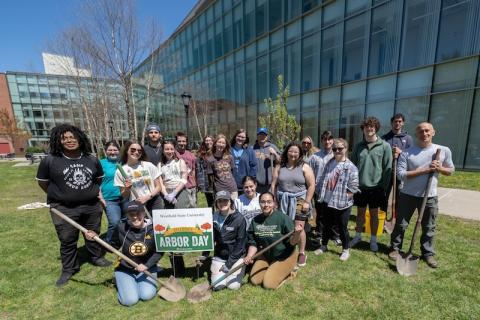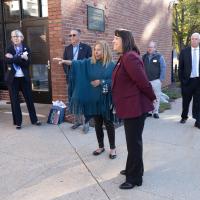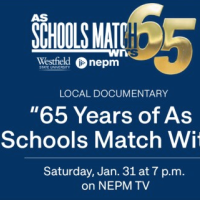
Westfield State Celebrates Arbor Day with Tree Planting Event

Arbor Day 2024.
In celebration of Arbor Day, Westfield State University hosted its annual tree planting event on April 25, continuing a tradition of environmental stewardship that began in 2016. The Environmental Science Department, in collaboration with staff from Facilities and Operations, has staged tree plantings each spring, with this year’s event commencing from 1—3 p.m. at the Wilson Hall greenhouses.
“It’s a special year because we received word that the Arbor Day Foundation is recognizing Westfield State as a Tree Campus,” Dr. Tim Parshall, Professor of the Environmental Science Department said. “This means that we have made a commitment to managing trees on our campus responsibly. Trees are beneficial for our campus in many ways. They help clean our air of pollutants and reduce temperatures in the summer, which is especially important in urban environments. Trees can help reduce climate change by taking carbon dioxide out of the atmosphere. On our campus, trees offer educational opportunities for our students and provide natural spaces that can reduce levels of stress.”
Dr. Parshall also expressed further gratitude to the Facilities and Operations department for helping to make the annual event such a success. “A big shout out to Joel Moser and the grounds department, and all the students who have helped out over the years,” he said. “They did a fantastic job of having the sites prepared so that students could plant the trees. The event couldn’t be done without them.”
In a special addition to this year's event, Westfield State planted 10 small American chestnut trees donated by former employee Bill Hardie from the biology department. Bill's personal connection to these trees, with his parents collecting chestnuts in the town forest near Westfield State, adds a poignant touch to this year's Arbor Day celebration, highlighting the university's commitment to environmental conservation and preserving natural heritage.
“We planted 10 American chestnut trees around the perimeter of campus that were donated by Bill Hardie, former caretaker of the greenhouses,” Dr. Parshall added. “American chestnut trees used to be a common part of the forests before being killed in the early 1900s by the chestnut blight, a fungus native to South East Asia. Bill tells stories of how his parents used to collected chestnuts in the vicinity of Westfield State before they disappeared. The chestnut trees that we planted have been bred to be resistant to the chestnut blight, so the hope is that they will become a part of the forests again.”


